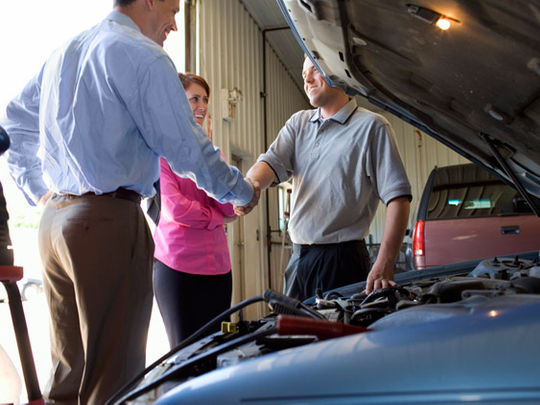
Dubai: Insurance companies and car-repair garages caught using fake spare parts could face lawsuits, a top official from Brand Owners Protection Group (BPG), a Dubai-based industry group for the protection of intellectual property, has warned.
The warning comes after circumstantial evidence emerged that vehicles involved in accidents unwittingly end up with fake parts during repairs done at non-agency garages working with insurance firms to keep costs down.
Omar Shteiwi, BPG Chairman, said: “Any person, including owners of garages and insurance companies — if it is proven that they are dealing with counterfeit parts — can be penalised according to UAE laws. Penalties include imprisonment and/or fines besides compensating the affected people or their hires.”
\'Dealing', the lawyer explained, means any activity such as promoting, offering, using, selling or commercialising such items. “Applicable laws in the UAE including trademarks and consumer protection laws prohibit dealing in counterfeited items, including spare parts,” he said.
A vehicle insurance is mandatory in the UAE at the time of renewal of registration.
Around 2,700 vehicles are registered daily in Dubai alone.
Besides fake parts, customers have also raised concerns about “dirty tricks” some unscrupulous insurance companies indulge in.
Angus, a Canadian, said that after his car met with an accident, his insurer told him his vehicle had been written off. “But I found out that my insurance company wanted to sell my car to one of the garages for a higher value than what they offered me as compensation.”
After he threatened to sue, the insurance company agreed to repair his car. “To add more misery, I was told by the same repair guy that my car would be fitted with fake parts and repaired by the cheapest bidder.”
Industry officials reckon that one out of four cars in the UAE is fitted with fake parts. Sajjad Pasha, national sales manager of Toyota dealers Al Futtaim Motors cited an in-house 2010 survey which showed 13 per cent of customers use fake parts offered by workshops and garages.
Hatem Abdul Gani, head of intellectual property enforcement at Dubai-based Al Shaali & Co law firm, said he is not discounting legal action against garages or even insurers. “If there is a formal complaint, we will do the required homework and take appropriate action.”
However, there was no immediate comment available from the Emirates Insurance Association.
An insurance industry official, however, who asked not to be named said the phenomenon is partly due to the cut-throat competition in insurance business. “The insurance industry is highly competitive which has driven premiums down, which has inevitably led to insurance companies resorting to the cheapest garage using fake parts.”
The official said motor insurance rates have been down by 40 per cent in the last year.
The UAE authorities have unleashed a relentless campaign against fakes, as the country is a prime re-export gateway for counterfeit parts between Asia and Europe.
A “triple sweep” against fake parts retailers was conducted recently in Abu Dhabi, Dubai and Sharjah, with raids spearheaded by the departments of economic development in the three emirates over a 10-day period.
Fight against fakes
Shteiwi said the general public should help in the fight against fakes. “The public has the right to know about the risks they face when their vehicles are fitted with fake car parts,” he said.
But car makers say it's difficult for ordinary motorists to know if their cars have been fitted with fakes as they are not in a position to know the difference between fake and genuine parts.
“In most cases, a spare part is seen only for a few minutes before it gets fitted inside the vehicle. This gives very little time to inspect and decide if a part is fake or not. Differentiating between a genuine and fake part is sometimes difficult and needs sufficient experience,” a Toyota official said.








